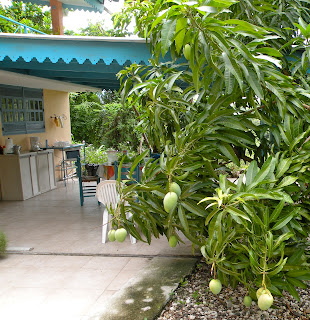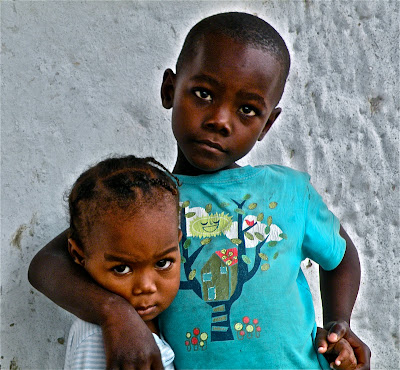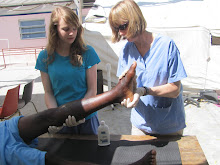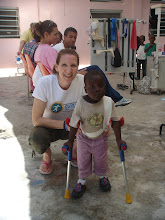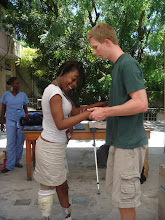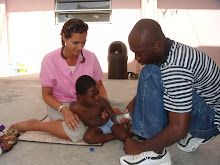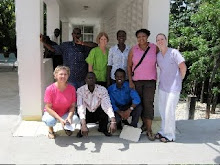During my two weeks in Haiti, there
were so many patients who touched my heart, but two who have found a permanent
space in it. My first day in the clinic I met a beautiful woman named Madame
Bleck. She had suffered a recent stroke and was very affected
on her right side. I am an OT who specializes in Pediatric
acute care so to assess, treat and communicate
directions
to an adult post stroke took some grad school recall
and some trial and error. I’m so grateful to Pascal and Andrew who sat
patiently as I thought out loud waiting to translate my instructions. Madame
Bleck also sat patiently with a smile and always carried out everything with
100% effort, wanting to do more than what was asked of her. She never
showed frustration and had a great sense of humor. I was
moved by the two things she really wanted to be able to do. First,
to safely transition in and out of kneeling to pray and
second, to return to her position as a greeter at church.
She was so determined and sharp that many times I’d tell her
what I wanted to try and before the translation was
complete she would be showing me a very similar task she had
come up with at home. I can say with certainty that she is
the hardest working patient I have ever worked with and
under all her strength was an even more impressive humility
and softness. I will not soon forget all that made her
beautiful especially her laugh. At the end of 2 weeks Pascal,
Madame Bleck and I would be laughing as if I spoke Creole
and she spoke English. Her happiness was contagious and
I will
miss her.
The
second was a young boy named Woodly. Not only did he get into my
heart, his story broke it. When we arrived at the clinic Monday
morning, there was a line of patients all
familiar,
with the exception of a father holding a school aged boy
like a baby with so much sadness on his face it broke my
heart. I soon learned that Woodly was 8 yrs old
with a
newly diagnosed seizure disorder. He had a seizure that
lasted 4 hours Friday and he hadn’t walked, talked or performed
any functional tasks since. This was very
different
than the seizures he had experienced before. My head was
spinning and I couldn't believe that a child who had a catastrophic
seizure 2 days ago was not in a hospital. I
did a
very gentle, basic evaluation and with the help of Pascal
and talked with Woodly’s father about what I was seeing that was
hopeful and the things that were concerning. I got
a splint
for his hand and sent them away with a very simple plan for
the evening and told them to come back tomorrow. I cried my
eyes out that afternoon. I have seen how
devastating
and difficult seizure disorders can be when you have all
the resources in the world. I felt so inadequate. Woodly
came back, and over the next two days was showing a lot of Improvements.
He was sitting with minimal help and walking with
help from his father. I knew that there was still a mountain
to climb because he had very poor motor control
and no
safety awareness. He also showed obvious visual deficits,
but he had a smile on his face and a new energy in him
and everyone, even the other patients that had seen
him
change in a week felt like smiling. But it was a short celebration.
During therapy that last day Woodly had another seizure.
It didn’t last long but he quickly returned to the
quiet
state that we first saw a week earlier. It was at this
point that his father expressed his despair. This is his last
living child and he can't do anything to save him.
He asked
me to take him home with me so he could have a better
chance. I saw so much love and pain coming from him and it
took everything I had not to break down right there.
I
promised that I would look into the available local resources
and that’s when I saw how important this kind of
clinic
is in Haiti.
Seven
days later, I was sitting in a restaurant in St. Louis as
Jo Ann, the executive director and co-founder
of Global Therapy Group took down Woodly’s name and said
there is help available and that she will get the process
started. Alone in the clinic that day I felt inadequate
because I was thinking I wish "I" could do more. That
night at dinner Jo Ann said, "It takes a village" and she is
right. As if working
at the clinic was not enough of a gift, it is impossible to talk
about this life changing trip without including the Hudicourt/Theodore
family and the amazing experience of being a guest in their
home for two weeks. From the moment I first spotted Anel my
driver at the airport, until he hugged me and dropped
me off two weeks later, I was surrounded by smiles, laughter
, warmth and care from Henri, Caroline, Pascal, Vincent,
Anais and Jessica. It’s amazing how well you can get to
know people in a short time when you turn off the distractions
and tune in to each other. We told jokes, played
games I hadn’t played in years, and some that were new to
me. I laughed harder on my trip to Haiti than I had in a
long time. I feel blessed to know them all and look
forward
to seeing them again. I wasn’t
ready to leave Haiti. My heart was so full and I was
just
getting really comfortable in the clinic and wanted more
time. Haiti is a special place. There is so much need and so
much work still to be done, but it is a reality that
co-exists
equally with a sense of hope and great love for country.
And more importantly, for family and each other. It is a magic
I have not felt in any other place. I will miss
it all,
but I can take the lessons I have learned back home
and
start creating some joy where I wasn't finding or creating
any before. It
wasn’t goodbye for me. It was “See you real soon and until
then I say thank you!” to Haiti and the amazing friends
I have made there. You sent me home a better version of myself and I am
so very grateful.
Woodly



.jpg)



















